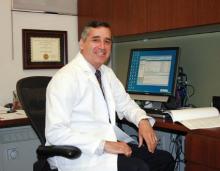Profiles in Rheumatology: Dr. David Wofsy
A career in medicine snuck up on Dr. David Wofsy. After graduating from Harvard with a degree in mathematics in 1968, his mind was occupied by the large moral issues of the day.
As the son of a labor-organizer father and social-worker mother who were hounded by the late Sen. Joseph R. McCarthy and the House on Un-American Activities Committee, Dr. Wofsy knew that one’s stand on important social matter might come at a price. And he paid it.
Inspired by the teachings and writings of the Rev. Dr. Martin Luther King, Dr. Wofsy applied for and was granted conscientious objector status during the time of the American involvement in Vietnam. Medicine’s appeal became clearer to him while he was performing his alternative service in the emergency room at the Los Angles County Hospital.
After graduating from medical school at the University of California at San Diego, Dr. Wofsy was a resident in internal medicine at the University of California at San Francisco, where he encountered what turned into his life’s work, he said in an interview.
"I was deeply moved by several young patients whom I met during my residency, who were dealing with life-threatening autoimmune diseases, especially systemic lupus. I also believed that the rapid pace of progress in immunology and biotechnology were likely to lead to exciting advances in rheumatology during the course of my career. I wanted to be part of that excitement."
That promise of impending clinical breakthroughs stayed with Dr. Wofsy through his rheumatology fellowship. Yet the frustrations with the clinical realities remained.
"I remember most the young women and men whom we could not help, who died when we all felt confident that we were within a few years of having treatments that might have saved them. When things are going well in our research, the excitement of discovery is all the motivation we need. However, when things are going poorly, it is the memory of those patients that compels us to keep trying."
Dr. Wofsy has remained at the UCSF, where he now holds the George A. Zimmermann Distinguished Professorship and is professor of medicine and microbiology and immunology. He was director of the rheumatology training program there from 1992-2006.
Dr. Betty Diamond, his long-time colleague, "I have known David well for 15 or more years, been a friend and collaborator. Our current clinical trial is one that we conceived in 2000, wrote a proposal for in 2001 and enrolled our first patient in 2007, so he certainly has patience.
"He is an avid Giants fan (the San Francisco Giants, not the New York Giants) and uses Barry Bonds to exemplify the concept of biomarkers (biceps for steroids). He is deeply committed to training, patient care, and integrity," said Dr. Diamond, professor of medicine and microbiology at the Feinstein Institute for Medical Research in New York, speaking in an interview.
According to one of his former fellows, Dr. Maria Dall’Era, happening upon him in the course of her training shaped her career.
"I joined the rheumatology fellowship program at UCSF in 2001 and began working closely with Dr. Wofsy as his mentee in 2002. Dr. Wofsy has been my mentor ever since, and it is because of his guidance, support, and leadership that I have been able to pursue a career in academic rheumatology at UCSF. I am currently associate professor of medicine at UCSF and I am director of the UCSF Lupus Clinic and [Rheumatology] Clinical Research Center. I can honestly say that I would not have achieved my success at UCSF if it were not for Dr. Wofsy."
"I remember most the young women and men whom we could not help, who died when we all felt confident that we were within a few years of having treatments that might have saved them," said Dr. Wofsy.
Asked about his own place in lupus research after decades at the task, Dr. Wofsy reflected that: "Within the lupus world, there are better basic scientists than I ever will be; there are better clinical scientists than I ever will be; there are better clinicians than I ever will be; and there are better teachers than I ever will be. To the extent that I have been able to contribute, it may be primarily as a translator in an era of translational research. Because I spent years doing bench research before devoting myself fully to clinical research, I speak both languages. That turns out to be an important niche that helps to make the most of the hard work and accomplishments of others."







